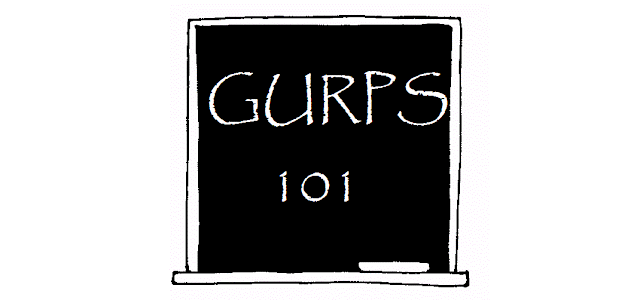Nothing helps build a character concept like the hint of some kind of secret or special training. In GURPS this can go be done in several ways, by taking high skills, having high attributes, or by taking advantages. The chief among these in the Basic Set are Gunslinger, Trained by a Master, or Weapon Master. These special traits allow you to ignore some rules, give access to others, or give a concrete advantage over those who are not specially trained. Gigermann asked:
“Our GM, inspired by How to be a GURPS GM, decided to cap skills at 18, requiring Trained by a Master to exceed that limit—that’s all well and good. But what about a wizard? Or a psychologist? TbaM has no effect for non-melée skills other than as a really-expensive Unusual Background/Rule Exemption. How would you do it?”
That’s actually a really good question and one that’s come up before in a playtest. GURPS Magic: Plant Spells had Unusual Background (Trained by an Archdruid) that allowed characters to do a small number of (really) cool things. So were I constructing a system to create a “Trained by a [Specific Type or Role]” how would I do it? Well, maybe something like…
Building Unusual Background (Masterful Training)
Suggested Benefits
First, determine what benefits Masterful Training gives you using the following rules. In most cases you’re going to simply get a reduction in penalties for a specific skill or task or the ability to purchase a trait otherwise off-limits to the rest of the campaign’s players. You might also get a enhanced default to a skill or even a default to a skill that normally doesn’t have one! You might even get a benefit for a skill or task that others cannot get at all without Masterful Training. Add up all the benefits first and then round the final cost up to the nearest multiple of five.
- Reduce a common penalty for a skill or task by half* (Example: Trained by a Master’s reduction of Rapid Strike penalties):
- Single Skill or Task: 1 point
- Small Group of Skills or Tasks (up to 6): 5 points
- Medium Group of Skills or Tasks (up to 12): 10 points
- Large Group of Skills or Tasks (13 or more): 15 points
- Buy a skill or advantage that’s normally off-limits† (Example: Trained by a Master’s Cinematic Skill access):
- Small Group of Skills or Advantages (up to 6): 0 points
- Medium Group of Skills or Advantages (up to 12): 1 points
- Large Group of Skills or Advantages (13 or more): 5 points
- Enhanced or Generous Defaults‡ (Example: Weapon Master’s defaults for weapon skills):
- Small Group of Skills (up to 6): 1 points
- Medium Group of Skills (up to 12): 5 points
- Large Group of Skills (13 or more): 10 points
- Enhanced Benefits§ (Example: Gunslinger’s Accuracy bonus):
- Single Skill or Task: 1 point
- Small Group of Skills or Tasks (up to 6): 5 points
- Medium Group of Skills or Tasks (up to 12): 10 points
- Large Group of Skills or Tasks (13 or more): 15 points
* Treat a task for a specific mode of attack as a single task for pricing. For example, “All Unarmed parries” would be considered a single task. Count techniques as half a skill. Optionally, halve the cost if you only reduce the penalty by 2/3 or double it if you ignore it.
† Ignore Perks for this rule and count any trait worth 5 points or less as half a advantage. Use maximum levels for leveled traits. For example, if you can buy DR 3 this is a 15 point advantage and counts as a advantage – not half of one.
If a trait has a prerequisite, subtract 1 from the final cost per such “buy in,” but before rounding up to the nearest cost. If a trait has a aspected tier system (like Weapon Master) then apply a series of Accessibility modifiers to determine the final cost after rounding.
Examples
A couple of examples:
Trained by a Master
Using these rules Trained by a Master could be broken up as:
- Cinematic Skill Access (Large Group): 5 points
- Off-Limit Trait Access (Large Group): 5 points
- Common Penalty Reduction – All Parries (Medium Group): 10 points
- Common Penalty Reduction – All Rapid Strikes (Medium Group): 10 points
Gunslinger
Using these rules Trained by a Master could be broken up as:
- Cinematic Skill/Technique Access (Small Group): 0 points
- Off-Limit Trait Access (Small Group): 1 point
- Enhanced Benefit (Full Accuracy Bonus for one-handed weapons) (Medium Group): 10 points
- Enhanced Benefit (Half Accuracy Bonus for two-handed weapons) (Large Group): 8 points
- Enhanced Benefit (Ignore Bulk penalty on Move and Attack and in close combat) (Single Skill): 2 point
- Common Penalty Reduction – Gun Techniques and Fast-Draw (Small Group): 1 points
Picking Over the Bones
Kromm tossed out a few useful bits that I added to my own system because hell, they make plenty of sense to me so I used them here. Such a system might be too fussy for some gamers – if that’s the case just find a similarly priced trait, alter it, and use it. You’ll know if the price is too high or low after a couple of game sessions using it.


I have looked up this post several times in the past few years–often thinking it was a Pyramid article first–and would thus like to suggest expanding it into a Power-Ups volume (perhaps along with expanding on Kromm’s “Blessed Be” from P3/78).
Thanks! It’s kind of short for a supplement though. It would need a lot of other things to make up even minimal word count for the shortest book (6,800 words or 12 pages).